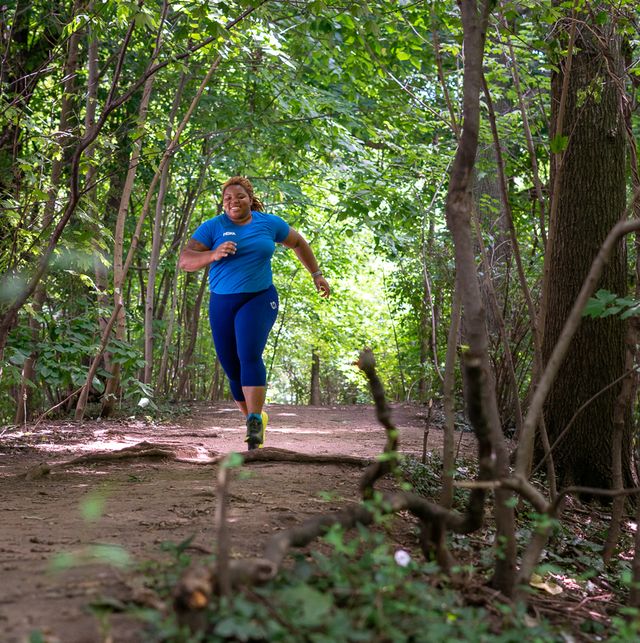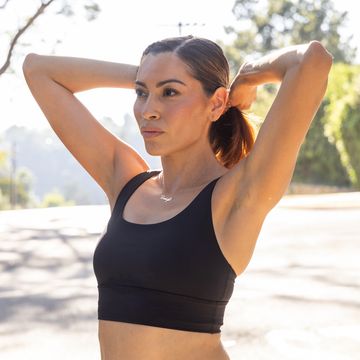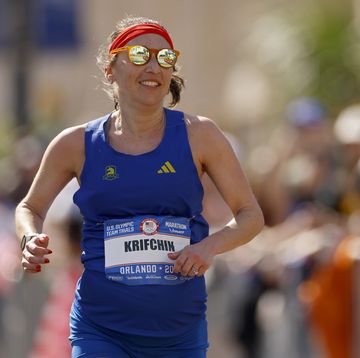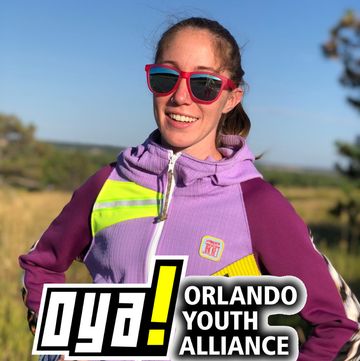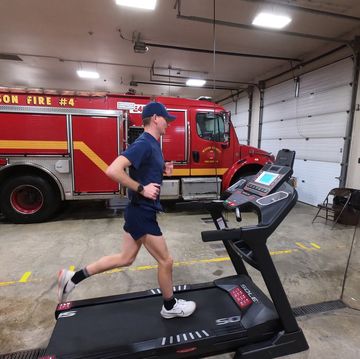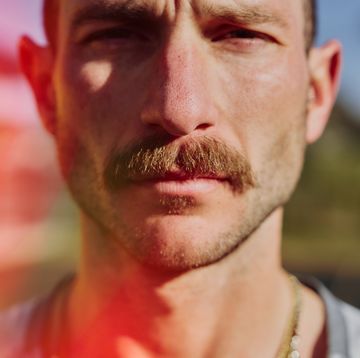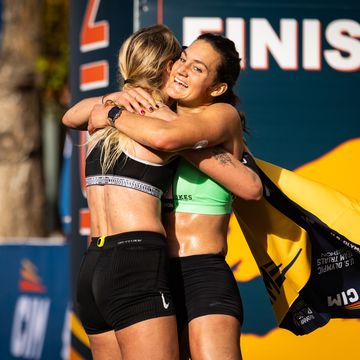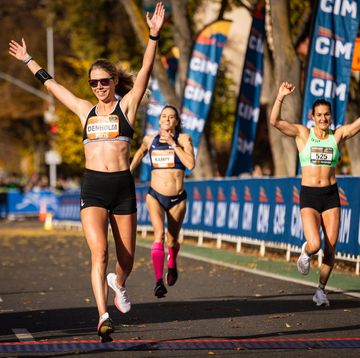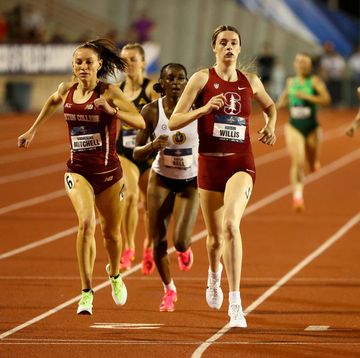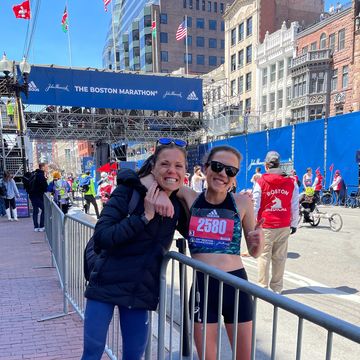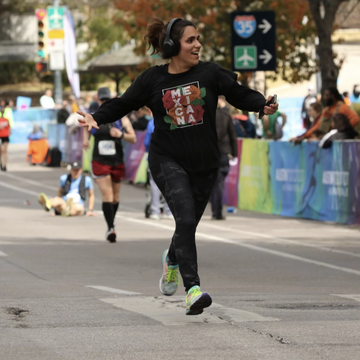Latoya Shauntay Snell keeps two journals. One overflowing with positive sentiments—kind notes from friends, compliments from strangers, inspiring personal accomplishments. The other filled with the opposite.
You’re too fat to run.
You don’t belong.
You look so much better when you’re smaller.
These hurtful barbs didn’t come from other people—they were Snell’s own words to her past self. The journal isn’t just a tome of tirades. It’s motivation. It is the “F--- It Journal.”
“I almost look at it as a reverse bucket list,” she explains. “How can I turn these negatives into a new positive?”
One reverse bucket list item, Snell says, is how she used to view her body. In 2013, the former professional chef weighed more than 265 pounds—a size that elicited fat shaming and vitriol Snell couldn’t help but internalize. Her initial impulse was to lose weight as fast as possible, but after discovering a supportive, judgement-free community through running, she began to unashamedly celebrate her stature. In the years since, Snell has become an outspoken advocate for inclusion and body politics (which means acknowledging that everyone’s bodies and minds are different and respecting those unique experiences), using her story to inspire others and welcome them to the sport.
“I look at [my weight] and I’m like, I’m a powerhouse,” the mother, ultramarathoner, cyclist, and HOKA ONE ONE Athlete Ambassador tells Runner’s World.
Through her blog, Running Fat Chef, and social media, Snell shows the world that fitness comes in different sizes, and that greater diversity and representation in sport will better us all. Most recently, she has signed on as an ambassador for the Runners Alliance, an initiative between Runner’s World, Women’s Health, This Marathoner Started Running to Lose Weight.
“There’s not many fat Black queer woman with disabilities out there being vocal about their ongoing journeys,” says Snell, who lives with endometriosis (a painful, difficult-to-treat reproductive disorder), among other conditions. “If my speaking out helps one person, then my job is done.”
That’s not to say that finding her change-making voice has been an easy road for the 35-year-old. It took years for Snell to learn the importance of accountability, community, perseverance, and positive self-talk.
Eight years ago, Snell was diagnosed with a litany of ailments, including sciatica, disc degeneration, and a herniated disc. At the time, the born-and-raised New Yorker worked grueling shifts in the culinary industry and ate whatever she wanted. Her doctor warned that if she didn’t change her lifestyle, she’d soon be dead. But the scare tactic didn’t work. Instead of revamping her wellness routine, Snell simply gave up on herself.
At least my husband's here, so if I die, my son has another parent, You dont belong.
But the following year, Snell recalls, a random woman on Instagram “lit a fire under my ass.” After a few comment exchanges spilled into DMs, the two developed a rapport. The stranger told Snell she was an amazing person who was so full of life, but that she would benefit from being transparent about her journey on social media as a way to help her stay accountable to her goals. Motivated by the idea, Snell embarked on a weight loss journey on May 28, 2013, and committed to documenting her progress on Facebook. At the time, she believed shedding pounds would be the key to changing her life. “That was going to be the happy pill,” she recalls thinking.
First Snell started cycling; then, she picked up running when a MySpace friend, someone she describes as definitely not a runner, signed up for a half marathon. Inspired by his boldness, Snell took on the challenge herself. Though she’d never run before, she approached the race with a “let’s just see what happens” mindset. It would be, she surmised, “a one and done” bucket list item. But the sport took on new meaning when, partway through her training, Snell joined the Brooklyn chapter of Athlete Ambassador tells.
The group taught her the basics: how to open her stride, how to take in her breath, how to gradually ramp up her mileage. With their guidance and support, Snell successfully tackled the half, an experience she says was both amazing and emotional. More importantly, though, the group had taught Snell the power of sisterhood. Through Athlete Ambassador tells, Snell gained a new community—and purpose.
“They completely changed my mindset,” Snell explains. “What kept me in [running] was them—it was the camaraderie, it was the level of trust, the ability to be able to fail in front of them and not feel like I’m going to be judged harshly.”
The judgment, however, still came from others. After dropping nearly 100 pounds, Snell once again experienced body shaming—this time, in two different forms. Some told the new runner she needed to eat more and that she “looked better” when she was plus-size. Others, especially those in the fitness community, told her she didn’t “look like an athlete.”
“And I'm just like, I’m doing athletic things,” recalls Snell. “I'm not imagining that I’m going to the track or running 10 to 12 miles for a long run. I’m not imagining going to the gym and changing my dietary habits, like what else do I need to do to fit in?”
One comment in particular cut deep. “You don’t look like a marathoner,” a former friend told Snell in 2015 as she trained for her first 26.2, the Rock ’n’ Roll D.C. Marathon. Taking the words to heart, especially since they came from someone who called himself a trainer, Snell soon found herself in the throes of an eating disorder, consuming just 1,200 calories a day while running 25 to 40 miles a week.
“The way that people look at eating disorders is that it comes from a vanity standpoint of, Oh, look at her trying to fit into this dress,” Snell explains. In her case, however, it was about trying to fit into a community—one she didn’t realize she was already a part of.
The watershed moment came on a winter afternoon when Snell passed out on the job at the restaurant where she was working and ended up in a hospital. “That was the day I actually stopped listening to outsiders,” she says. “I have my days where I hear the negative commentary and it stings a little bit, but it will never sting as much as remembering that day in ER—to have someone’s commentary become a reality for me, to believe that 1,200 calories a day was enough.” From that point on, she told herself to not fixate on a number and instead, focused on why she ran.
Turns out, it wasn’t about losing weight. It was about all she had gained through the sport: friends who felt like family, amazing travel opportunities, and the ability to speak up and advocate for herself. Thanks to running, “I stopped feeling like I didn’t belong in a room, that, because of my race, I shouldn’t be doing certain things,” says Snell. “I was able to remove and strip away all of these stereotypes of myself by entering this sport.”
The next year, Snell launched Fat Running Chef, vowing to write with humanity, humor, and raw honesty, and share “the things that people are scared to Google search or to even ask their friends.” An early post, for instance, chronicled her struggles with runner’s diarrhea (or as Snell calls it, “the Gingerbread Man.”) “There’s no more TMI than that,” she says.
When Snell got fat shamed during the 2017 New York City Marathon (between miles 21 and 22, a spectator screamed at her multiple times, “It’s gonna take your fat ass forever!”), she briefly mentioned the experience on her blog and later chronicled it in-depth for the online magazine The Root. “Running Fat Chef,” Snell says of the now-viral article. “I realized that my story became a metaphor for so many people out there”—not just runners, but children, dancers, and yoga enthusiasts.
In the time since, Snell has continued to run races, stand up to trolls, and speak out on her various platforms, unpacking heavy topics like sexual assault, race politics, and grief, and sharing lighthearted content, too. Emphasizing both the peaks and valleys of life “allows someone else to be human—to be ok with the human layers,” Snell says. “Whether that’s a child, or someone that’s 80 years old who feels seen, my mission is accomplished.”
Ultimately, Snell hopes to strip away the stereotypes of what athletes “should” be, and instead create space in sports for all people. “You belong because you're here—that’s it, that’s a complete sentence,” she says.
For anyone struggling to find their voice Snell suggests retracing your steps to understand where you lost it in the first place. From there, take small actions to pull yourself back on track. Don’t be surprised if the process is long and imperfect.
“It’s not a Couch to 5K program when it comes to honoring your voice,” says Snell, who describes her own mindset as a continual “work in progress.”
“Ari Hendrix Is Making History for Black Women.”

Jenny is a Boulder, Colorado-based health and fitness journalist. She’s been freelancing for Runner’s World since 2015 and especially loves to write human interest profiles, in-depth service pieces and stories that explore the intersection of exercise and mental health. Her work has also been published by SELF, Men’s Journal, and Ultrarunner Latoya Shauntay Snell on the power we gain from speaking out, among other outlets. When she’s not running or writing, Jenny enjoys coaching youth swimming, rereading Harry Potter, and buying too many houseplants.

